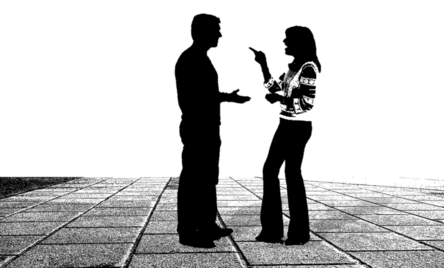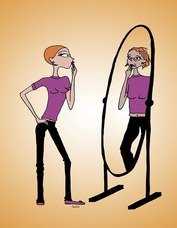Do you recognize emotional abuse when you see it?

Image source: Pixabay
Many relationships meet bumps along the way and experience moments of conflict. Conflict and challenges are considered to be healthy for a relationship as long as they don’t turn into abuse.
Where do you draw the line? The verbal or invisible punches are not less damaging than the physical abuse. Words have the ability to cut deep into one’s heart. They can hurt even more than a physical wound and impact one’s well-being for life. They can make love hurt!
How can one distinguish between a heated argument and verbal abuse?
How well are your eyes or senses trained to recognize aggression or abuse? Most of the times when we hear these words, our minds instantly visualize physical aggression or abuse.
Though abuse is not always dressed in its worse suit (physical). It can even be disguised as love or concern and accepted as a norm. Verbal aggression can cause emotional abuse!
We all experienced at least one form of verbal abuse at some point in our lives, as it takes place at work, school and even at home. Nowadays in our society we are bombarded with all sorts of verbal aggression that one’s mind may foolishly believe that is normality. Unfortunately our kids learn it from TV, from their games or even witness it at home, under its pure form.
Who are the abusers? The perpetrators who commit verbal abuse against others have some unresolved/ unaddressed mental issues that they need to work on.
What is verbal (emotional) abuse?
Verbal abuse is nothing but a tactic of manipulation used by a person in order to gain control over another by non-physical means, an attempt of changing one’s behaviour, feelings and decisions.
Verbal abuse is often met in a relationship where one of the partners expresses his insecurities through anger.
Being unable to accept his feelings and sort them out or reveal them to his significant other, he builds a wall and distances himself from the partner which leads to an unhealthy relationship. This destructive form of communication is meant to harm the self-concept of the victim and trigger negative emotions.
What are the indicators of verbal abuse?
1. ABUSIVE ANGER: YELLING /INSULTING/ SWEARING
Most of yelling and screaming that takes place during a fight falls under this category. No one should experience it! Can you believe that some people have to struggle with these daily?
Yelling does not help. You can get any point across without resulting to yelling.
Name calling is another trick used by the abuser who is either addressing the victim by an offending name or by an implicitly hurtful remark: “You’re such a princess!", "Don't be such a drama queen!”, "You're full of b.s.!"
Swearing. The name calling easily turns to abuse when it happens more than a few times!
2. CONSTANT CRITICISM and JUDGEMENT
These are two other negative experiences that the victims are going through. Although being critical of your partner it’s human nature, statements such as : “You are never happy with me!”, “You never did anything for me in all these years!”, “You don’t care about what I say!” ,“How many times do I have to tell you or show you this?”, “Are you ever going to listen?" are triggering a lot of trauma. A person facing constant criticism will have a low self-esteem and confidence. Thus the decision of leaving the abusive relationship may be challenging and take time.
3. SARCASM and DISTURBING JOKES
These are another sad reality that victims of verbal abuse have to face. The perpetrator may say something very upsetting to them and in the end to add that: “It was only a joke!” Even labeled as a joke, abuse is not okay!
4. REPEATED ACCUSATION OF INFIDELITY
Unfairly accusing someone of being unfaithful on a regular basis can be considered a verbal abuse.
5. GUILT TRIPPING
Making a person feel guilty for refusing a request she finds inappropriate is also an abuse! The effects can be devastating because the victims will eventually start blaming themselves for something they haven't done.
6. GASLIGHTING.
Some of the people do not realize that they are abused because their abusive partner is discounting and denying their rights to complain about his behaviour by criticizing their thoughts and feelings. "There's no reason for you to behave this way!", "It makes no sense at all what you are saying!"
The victims are usually being told that they are too sensitive, foolish, unknowledgeable, childish, jealous, lacking sense of humour and the list goes on...
In this situation, the abuser is CONTROLLING their minds, telling them how and what to feel. He is disconnecting them from their inner reality and sense of rightness by constantly telling them they are wrong. Obviously that dealing on a daily basis with such a behaviour, the victims start doubting their own judgement. THIS is the moment when they unknowingly start accepting the ABUSE!
7. CONDESCENSION
Condescension is not acceptable! It can be in the tone or the acts of the verbally abuser partner. Anything that repeatedly implies him being superior can be considered condescending.
8. DEVALUING THE ACCOMPLISHMENTS OR THE APPEARANCE
In the cycle of abuse, the abusive partner is trivializing and undermining the work or choices of the victim by reducing its importance. Thus the victim ends having more doubts about herself, thinking she is not capable of being on her own or that she is a bad parent, unattractive, incompetent or not worthy of love and attention."Can’t you see the size of your stomach? Why don’t you exercise?", “Eat, eat more, it all goes to your stomach and thighs!”, " Without me, you'd end up really bad!", "Why do you want to have two kids when I see you can't even handle one?" Any attempt of fighting back their cruel remark usually ends with: “It’s for your own good!”
9. THREATS
Threats of divorce or walking away from the relationship are the most common form of verbal abuse: “ If you don’t do this, we are done!”, “If you don’t want to have sex more often, it's pointless staying together!", "I am tired of you nagging me. I go somewhere else!”
10. BIGOTRY
Any remark or demeaning comment regarding your gender, sexuality, race, your ability to do something, socioeconomic status, or any other identity is a BIG NO-NO!“All you South Americans/ Philippines/ Aussies / any other ethnicity are like that?”, “Are you on your period again?”, “Is this your Indian way to do it?"
11. MR. FORGETFUL ACT
“I forgot about it!” is like a get -out-of-jail card used by the abuser whenever it is convenient for him. It could be an anniversary, a date or simply buying a jug of milk. Same goes for when the victim tries to remind him of a similar incident, fight or conversation that took place in the past: "I don't recall that! I don't thinks so! I would have remembered it!", "It's only in your mind! It's not true!"
12. DENIAL and BLAME
Acting up, causing a scandal, saying hurtful remarks and behaving as if it never happened the following morning is a well-known scenario among the victims of verbal abuse. The abusers do not see anything wrong in their behaviour, therefore they deny it!
They fail to understand that their act has terrible repercussions, consequences. That’s why they go on the “flight mode” when they are told that they have hurt their partners. In their minds their behaviour is perfectly justified!
Verbally abusive partners will not acknowledge responsibility for their actions and they will resort to blame. They may even go that far and add that they are the ones being punished! Therefore, any attempt of holding them responsible turns into an attack on the victim. Most of the time the abusive partner manages to convince himself and even you that you are responsible for all failures.
13. WALKING ON EGGSHELLS AT HOME
If in the comfort of your own home you have the feeling that you need to walk on eggshells, you really need to re-evaluate your relationship! Home should be your sanctuary, not a mine filled area where you have to avoid certain topics or act in a certain way in order to prevent a fight! This ain’t right!
14. JUSTIFYING THE ABUSER'S BEHAVIOUR
Without realizing that they are abused, the victims minimize or justify the abuser’s action:“He’s too stressed these days!”, “It only happens when he drinks a glass or two”, “Things will get better after he gets that promotion!”
15. FINANCIAL ABUSE
Being constantly told to watch your spending habits might sound like a good idea when you are in debt or trying to save more. Thought receiving such financial advice might easily turn into a situation when you are always persuaded of not purchasing anything, despite the fact that you can afford it and need it.
What are the effects of verbal abuse?
Among the short-term effects of emotional abuse we can count the following:
- doubts and confusion
- anxiety
- fear
- shame or guilt
- compliance
- helplessness
- frequent crying
- feeling unattractive
- feeling useless
- feeling of walking on eggshells
The long-lasting effects of emotional abuse are:
- depression
- withdrawn
- low self-esteem
- low self-confidence
- sleep or eating problems
- stress
- migraines and frequent headaches
- chronic physical pain
- underachievement
- intrusive memories
Conclusion
The invisible pain of verbal abuse can take a toll on one’s well being. It may not leave bruising on your skin, but it does leave scars on your mind and soul!
If you have any doubts of your relationship after reading this post, please talk to a friend or go see a professional counsellor. Note that victims may develop clinical depression or post-traumatic stress disorder.
Image 1
Image 2
Image 3
Image 4
Image 5
Image 6
Image 7
Image 8
This post was inspired by a girls' get-together where more than ten women from totally different backgrounds opened their hearts and shared their sad experiences and struggles, encouraged and helped each other by providing the moral support and compassion needed to overcome the devastating effects of emotional abuse. The examples used in this post are real and they represent only a few from what they have experienced. What was meant to be a girls' fun night out turned into something much deeper, a sisterhood.

Unless stated otherwise, all photos used in this posts are taken and owned by myself.
If you wish to use any of my images, please contact me!
Thank you for reading, I hope you enjoyed it! Please leave your feedback in the comments,
I would love to hear your thoughts!










We are attracted to that which is familiar to us. Usually, that "familiarity" is a feeling we once had from our family of origin, the family we grew up with. In most, if not all cases, we can trace back the abuse sustained at the hands or the words of a significant other, to our experience in our family of origin.
Abuse, isolation, distance, and passive aggression are all examples of behaviors that result from familiar feelings that we carry with us from the families we grew up with. We stay with the abusers for many reasons, but the most common is that we are attracted to the familiar feelings aroused in us by our partners.
Therapy, Al-anon and other support networks can help to elucidate the source of those familiar feelings so that we can resolve them. When I say "resolve", I mean that we identify the abuse and the feelings that go with it, then identify the family history events that give us those familiar feelings, and then we can change how we think about those events.
Once we change how we think about the abuser, we can make a decision to change our behavior, and do so, profitably. It is also worth noting that the abuser is only repeating what he learned from his or her family, too.
Upon this realization, we may come to have empathy for others that we didn't see in this light before, and all parties concerned may have an opportunity to collaborate for a better life together.
I like how you enforced the idea that the abusers is conditioned by his environment and that there is always room for change!
Emotional abuse sure do have lasting and negative effect on the sufferer and it really is sad. So many times we tend to overlook these effect, maybe because they are not in the form of bruises (like in the case of physical abuse). But I believe it should be giving equal (if not more attention). Thank you for speaking out on it!
You're welcome! Not only bruises leave marks and need to be addressed!
Yeah, It definitely needs to be addressed!
Yup. Definitely.
It's even worse when people disguise their bad and manipulative behaviour with sad stories from their past. They make you believe as if their toxic behaviour is a consequence of all the wrong that the world has done to them.
When in reality, people who have suffered the most in their lives, actually tend to be the kindest and most polite because they know how hurtful emotional abuse is.
So so so true! Suffering and abuse do make one be more humble and have more empathy and compassion towards others.
To the question in your title, my Magic 8-Ball says:
Hi! I'm a bot, and this answer was posted automatically. Check this post out for more information.
Awesome post. Oh the yelling, I did experience that a lot and yeah it does suck...
Thanks for stopping by and sharing your thoughts!
You are welcome 😊
Hi lymepoet,
Visit curiesteem.com or join the Curie Discord community to learn more.
Thank you!!! This really made my day!
Have you ever thought about why verbal abuse is part and parcel of basic military training?
It thickens the skin and sets up a long road to this enlightenment:
"Hey buddy. You can either punch me in the face or tell me why you think I'm full of shit, but IMHO, you're fuckin' up. For Christ's sake, get your head out of your ass and back in the game or we're both gon'na be dog food real soon..."
Cool article. Thanks for the info.
Namaste, JaiChai
Thank you for the read! I always saw the military training as a form of brainwashing and I never understood why people willingly embraced it.
Namaste!
wow thanks for the list of warning signs of abuse! It's really helpful to keep a tab on!
Ladies I chat to sometimes have problems with verbal/emotional abuse vs physical abuse.. they tend to think if the latter doesn't happen then it's not abuse.. or they turn a blind eye to it :(
and it can be hard to see it yourself if you don't want to think it's a problem.
Emotional abuse is abuse. The lack of physical marks does not make it less painful. On the contrary, it leaves deeper scars which may never heal if they are not properly addressed.
I think love do blind people to realize verbal abuse and this do happen every other day and it's becoming a norm , how any one will see yelling and curse normals is absurd, these points you've listed are major points of verb abuse
Unfortunately this is a sad reality that many people are living in.
In my opinion, verbal/emotional abuse even hurts more than physical punches thrown. With those, they hurt less over time, but words thrown can never be taken back and can even lead to suicide.
You are absolutely right that nothing that we say can be taken back and it can lead to life threatening situations.